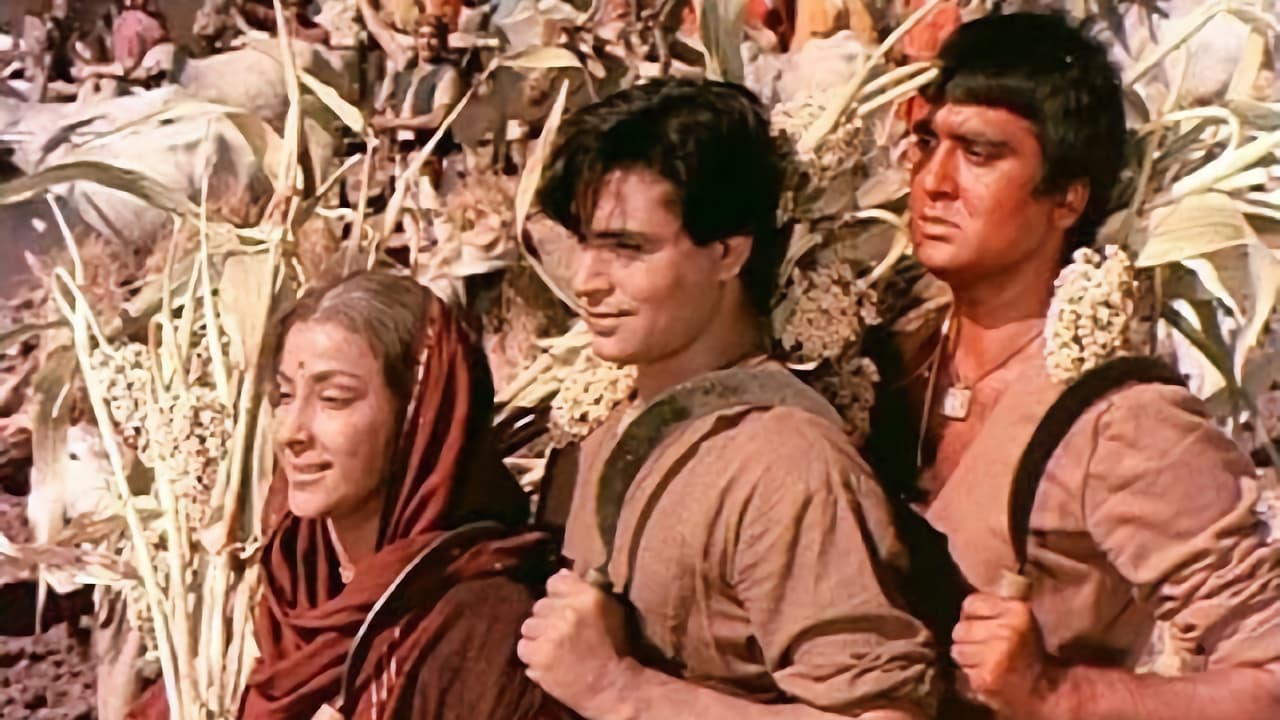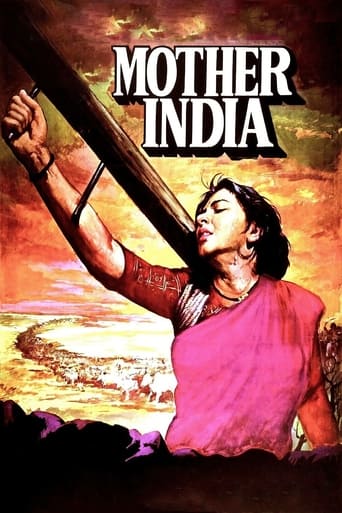

one of my absolute favorites!
... View MoreIt's fun, it's light, [but] it has a hard time when its tries to get heavy.
... View MoreThe performances transcend the film's tropes, grounding it in characters that feel more complete than this subgenre often produces.
... View MoreThis movie was so-so. It had it's moments, but wasn't the greatest.
... View MoreMehboob Khan's Mother India reserves a special place among all time great and memorable Mega Hit films. Nargis has consummately performed a versatile role of a mature Indian mother who would not allow her own son to rob the honor of their village at any cost. The climactic last scene of the epic, where Radha shoots her son in the back, while Birju was all set to kidnap the cruel money lender's daughter is a tragedy sequence that can be commensurately compared with the ending of another emotionally charged film - Shakti, where Dilip Kumar shoots in the back of his son "Amitabh".However, Birju's angry performance in this movie steals the show at many a times; for instance, when he argues with his mother and brother about the greedy Bania moneylender who had fleeced their family from all earthly possessions through the odiously manipulative annual interest rate charged by him, although they have toiled day and night to return the debt.It is a great melodramatic picture, containing magnificent performance by Nargis and Sunil Dutt, while manifesting the impoverished economic conditions and abysmal living standards of a typical Indian rural family who were driven in utter disgust, shame and tragedy due to the volatile temper of one of their family members. However, seething poverty was not the sole reason which perturbed Birju (Sunil Dutt) to become an outlaw and murder Sukhi Lala (the rapacious money lender), but the very ominous and cruel person hidden in the money lender, who, in a backward rural social setup took full benefit/advantage of the poor, illiterate and weak elements of village social order.Besides, the strong and moving story line, Faredoon has captured mesmerizing stills providing an excellent background setting of the full horizon picture down to the ground level with spreading murky clouds at dusk against the backdrop of silhouetted actors.It is definitely a must see movie having marvelous and stupendous cinematography, as well.
... View MoreNargis stars as a suffering woman, Radha, experiencing tragedy after tragedy, surviving it all. The first half of the film doesn't promise anything overly special. A poor community falls under the weight of a moneylender, Sukhilala. When Radha marries, her mother-in-law mortgages her farm to pay for the wedding and Radha's jewlery. Since the mother-in-law has no education whatsoever, Sukhilala, probably the only educated man in the village, is able to take advantage of her. When she challenges Sukhilala's claim, she can't do much to disprove their deal. This part of the story is pretty cliché, rather predictable and very questionable. Sukhilala is a fairly standard villain, very cartoonish and simplistic. The audience is programmed to hiss at his every appearance. The conflict is compelling, but I was hoping for something more complex. It is nice, I suppose, to see the system challenged, but the fact that the system is challenged does not necessarily mean that the film challenges the system in an insightful manner. In reality, the film's solutions to the problems are all melodramatics.Luckily, something else is brewing in the film at this point. Radha has two sons, Ramu and Birju. The story starts to focus in on Birju, who is very obnoxious. His mother loves him dearly, spoils him, and he becomes simply evil. I should say at this point that the little kid who plays him as a child, Master Sajid, is very, very annoying, not to mention a terrible little actor. As an adult, Birju is a devil. Sukhilala still runs the place, and now Birju is big enough to do something about it. Thankfully, Birju is not made a hero. Well, perhaps an anti-hero, but at least we're spared him becoming an Indian Robin Hood as I expected. Complexities begin to develop in the way Sukhilala is depicted, and, while he's still the villain, the audience is no longer programmed to despise him on site. Radha has to both protect her son and stand up for what is right. The climax is so extremely impressive that I was almost convinced that the film was great.Yet the film is not what I would call great as a whole. There were dozens of scenes that I loved, but, as the film goes on for three hours, there was plenty to dislike, as well. The fat and gristle detract. Did I mention there are great songs? Great indeed! I love Hindi music myself. The cinematography is also often exceptional. 8/10.
... View MoreThis film had me in tears at least three times; and not tears of sadness, but because it was just so beautiful. Don't expect anything near Hollywood slickness; if you want to find errors and things to laugh at, there are dozens. But the whole spirit of the piece is very poetic. In Hollywood movies, the musical numbers are when I take a break and go out. But in Indian movies, the musical numbers are spellbinding! And in this one, perhaps the best. The lyrics, the melodies, the staging (even with noticeable lip-sync) are just wonderful. Take the best songs from Broadway musicals and compare them to these, they've met their match. The passion in the lead female voice matches Callas. Superb!
... View MoreThis was a movie about a strong woman of honor, Radha (Nargis) and her family, a usurious man, and the poor village they live in. The lender breaks villagers' backs by charging interest at such a high rate that they give something like 3/4 of their laborious harvest to the lender just to cover interest, keeping the debt in perpetuity. Almost nobody around can read, so the terms of the original contract are never clear. Though the situation keeps the woman's family downtrodden financially, she staunchly preserves her pride and dignity.One of her sons, Birju (Sunil Dutt), is portrayed as always being a "problem" right from childhood, and while I could understand his rage against the moneylender, I found his vengeance hard to believe, especially the self-destruction that pitted him against his own family members. I like the ending and really laud Radha, who realized that one's dignity and honor is priceless and shouldn't be bartered away.I found the film to be too long (it lasted around 3 hours); the story could have been just as compelling if it were an hour shorter. I would recommend the film and would rate it 6 on a scale of 10. I saw it as part of an Indian film festival, where it was projected on a movie screen from DVD and had English subtitles.
... View More